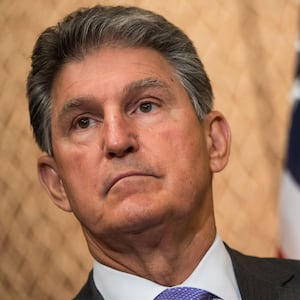When activists paddled their kayaks to Sen. Joe Manchin’s houseboat in Washington, D.C., earlier this month to protest the West Virginia Democrat’s opposition to a $3.5 trillion social welfare bill, what they encountered was a man very comfortable with being heckled.
Like others who have pressured Manchin to reconsider—Sen. Bernie Sanders (I-VT), Senate Majority Leader Chuck Schumer (D-NY), and pretty much every other liberal activist and elected Democrat between them—these progressive pushers aren’t moving Manchin.
In fact, they may just be stiffening his resolve.
Part of the reason Manchin has survived in the increasingly red state of West Virginia is because he’s built a reputation as a true moderate. He is known for dashing Democratic dreams large and small while finding chances to back Republican priorities.
And it’s exactly these big moments—when Sanders and like-minded Democrats express their endless frustration with Manchin—that help him burnish the gadfly credentials needed for a Democrat to survive in a state that went for Donald Trump in 2020 by 38 points.
So, despite visits from angry kayakers, millions of dollars spent on ad campaigns pressuring him, thousands of calls to his office, and countless meetings with various constituents, Manchin has so far not budged a dollar on the Democrats’ signature legislation.
If anything, he’s doubled down.
In the past week, as negotiations with congressional Democrats and the White House reach a critical phase, Manchin has scuttled a clean electricity standard most of his colleagues believe is essential for fighting climate change. He’s reportedly insisted that a new monthly benefit for families be cut and limited to households making less than $60,000, far below the threshold proposed by President Joe Biden. And he’s insisted on work requirements for that child tax credit, meaning the neediest families also won’t be eligible.
At this point, those who are pleading with Manchin not to buck his party’s agenda are at a loss. That’s particularly the case for some of the senator’s own constituents, who have sought to make the case directly to him that the party’s sweeping proposal would provide much-needed investments in their home state, one of the nation’s poorest.
“It’s become insanity to us,” said Angi Kerns, one of the West Virginia activists who confronted Manchin from a kayak on the Potomac River outside his houseboat.
“We’ve done everything we can do in West Virginia—collected stories, amplified voices, thousands of people are calling a day,” she told The Daily Beast. “He doesn’t care. The only option we have at this point is to make ourselves be heard.”
Others feel the only remaining way to move Manchin is by saber-rattling about pushing him out of office altogether.
Katey Lauer, an organizer with the progressive group WV Can’t Wait, argued that “even the most effective citizen advocates can’t compete” with what she called the senator’s “long-term allegiance to corporate interests.”
“The only chance we have to move Joe Manchin,” Lauer said, “is to build a credible threat to replace him.”
Most Democrats know that however Manchin leaves office, a Republican will almost certainly take his place. Some West Virginia advocates seem intent to work with the Democrat that they’ve got—and see subtle signs that the pressure campaigns may be working.
Seth DiStefano, policy outreach director at the West Virginia Center on Budget and Policy, pointed to Manchin’s meetings this week with two key progressive lawmakers—Sanders and Rep. Pramila Jayapal (D-WA), the chair of the Congressional Progressive Caucus—to discuss the finer points of the legislation.
“I don’t think he’d be doing that if he were not seeing and feeling some of the internal pressure coming from his own constituents and major community leaders,” DiStefano told The Daily Beast.
While there’s little sense that they’ve cracked the Manchin code, after months of engaging with him, advocates do feel like they have a sense of what works in reaching the senator—and what definitely does not work. As Manchin continues to wield near-unparalleled power over the party’s legislation, those lessons may prove crucial for those pushing for concessions from the senator in negotiations. The senator’s office did not respond to an email seeking comment for this story.
What does not reach Manchin, several people said, are splashy ad campaigns and videos produced and bankrolled by out-of-staters that may go viral but do little to move the needle in West Virginia.
“I cannot express to anyone how little he cares about some outside group coming in and running ads and expecting that to work,” a Democratic strategist told The Daily Beast.
DiStefano mentioned a video produced by author Don Winslow which slammed Manchin as a “Senator for Sale”—and had one million views as of Tuesday. “That stuff doesn’t help,” he said, and added that past campaigns that urged outrage liberals nationwide to pressure Manchin directly had the effect of overshadowing in-state voices.
“A lot of bigger national organizations made a mistake by insisting their entire national listserv bombard Joe with 50,000 emails, 48,500 of which don't come from West Virginia,” said DiStefano. “It was difficult competing for airtime... There are a lot of great people in West Virginia who’ve been working on these issues for a long time.”
Many West Virginia progressives feel differently, however, about a recent move from Sanders. The Vermont socialist, who had been sparring increasingly more publicly with Manchin over the party’s agenda, placed an op-ed in West Virginia’s biggest newspaper last week, in which he urged the passage of the entire proposed $3.5 trillion package.
Sanders did not go after Manchin, but he bristled at the message anyway, and issued a statement shortly thereafter in which he maintained he opposed the bill and that “no op-ed from a self-declared Independent socialist is going to change that.”
It may have been a shot across the bow, but the West Virginia activists said it pointed toward a way to engage with the Senate’s key swing vote: on substance, and with a relentless focus on spelling out the impacts of proposed plans on his constituents.
Liberal advocates in West Virginia have an unusual relationship with the senator they’re often cajoling. He may resist their pleas, but because he is so attuned to his reputation back home, he tries to avoid stiffing his constituents. That means some advocates have had multiple meetings with him over the years—which are not always groundbreaking but can be productive.
Kerns said before showing up at Manchin’s houseboat, she had met with him or his staff directly five times so far this year. In those discussions, she said, it was tough to dislodge the senator from his talking points—until she started speaking his language.
“It’s not what you say, but how you lay it out for him,” Kerns said. “To get his attention, it has to be structured in terms of an investment, a return on investment… then, as a businessman who cares a lot about dollars and cents, he at least takes pause, and he doesn't have a pre-set narrative.”
Getting as far away from an ideological discussion as possible is crucial with Manchin, said DiStefano. “The over the top rhetoric only reinforces the national media narrative, which has not been the best,” he said. “The key to success is presenting an argument to the senator, begin with data, lead with your values, and your values should be delivered by people who are living this.”
To that end, DiStefano’s group, and other organizations, have amplified the experiences of constituents who stand to gain most through the programs in Democrats’ legislation—vastly expanded child care and senior care, universal pre-K, new Medicare benefits, and the monthly child tax credit that Manchin has wanted to restrict.
If any approach will be successful, some say, it’s that. “He is a positive, optimistic person,” said the Democratic strategist. “Any approach you’re going to take with him, be positive. Tell him the plus points of it. That’s the way to go about it.”
Certainly, Manchin’s colleagues in the Senate are largely taking a similar tack, even if they disagree strongly with his policy positions. Several are pressing him privately to relent on key fronts: Sen. Sherrod Brown (D-OH) told The Washington Post on Tuesday that he had a lengthy conversation with Manchin about how much the child tax credit could cut poverty in West Virginia.
Sen. Mazie Hirono (D-HI), who is diametrically opposed to Manchin on a number of fronts, said the right way to approach the West Virginian is to “persuade him, not to try to pressure or pounce on him.”
And Sen. Richard Blumenthal (D-CT) expressed hope that Manchin will “listen to his colleagues.” But, he added, that he couldn’t “tell you what is most effective, tactically.”
“The best metric,” he said, “will be the outcome.”
With Democrats racing to compromise on the top lines of the legislation, that outcome is drawing nearer. Activists say they will continue to pressure Manchin in new and creative ways, even if he has only seemed to dig in so far.
“At this point, this is kind of DEFCON 1 for us,” Kerns said. “There’s not a strategy we’re not willing to employ.”










